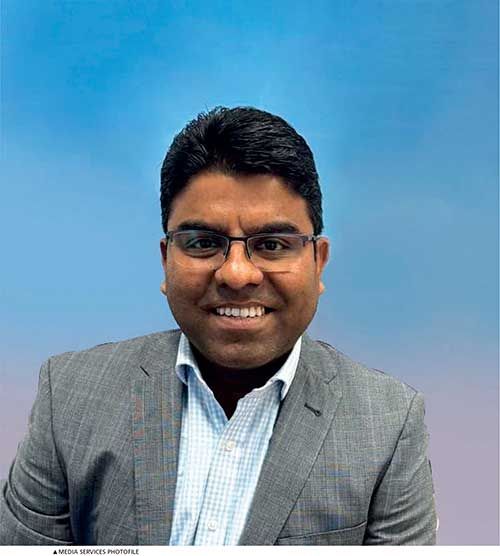Adrian Arulanandham
Staying ahead of the curve

Q: What motivated you to pursue a career in finance and auditing?
A: I believe that it was a God given desire to pursue finance; but like many others, I did not know which path to take.
An opportunity to join PricewaterhouseCoopers (PwC) in 2000 (with the help of my uncle Chryshantha Devarajan) directed me to the right path and I haven’t turned back. My experience with the firm provided the perfect foundation to pursue finance to its fullest.
I must mention Pushpa Panapitiya (a former Director of PwC), who was a great mentor; it was my privilege to have been mentored and trained by her. She encouraged me to never give up.
Q: How has your experience working in different countries (i.e. Sri Lanka, Australia and Papua New Guinea – PNG) shaped your professional outlook?
A: I was fortunate and blessed to have had the opportunity to work overseas. It was a challenging experience and took me out of my comfort zone. Having the desire to learn from those around you is particularly important.
The opportunities to work with astute senior professionals from different countries and of various calibres helped me learn from their knowledge and experience.
Having said this, my initial experience with PwC in Sri Lanka laid a solid foundation – especially the opportunities to work closely with highly experienced senior managers and partners, who had the time to train us and share their wealth of experience.
Q: What are the most significant changes you have observed in the finance profession over the past decade or so – and how do you stay up to date with the latest trends?
A: Data analytics and automation are contributing to significant changes in the landscape of finance, both in accounting and auditing. Many leading organisations have greatly increased efficiency in transactional functions.
In contrast, there have been fewer efficiency improvements in the more strategic areas of finance – such as financial planning and analysis (FP&A), optimising capital structures, tax planning, controllership, internal audit and financial risk management. This is likely to change.
Keeping up to date with the latest trends is easier than in the past as there are vast resources available. I prefer online seminars for more complex topics, as they provide opportunities to clarify technical questions. And I refer to many blogs and vlogs from reliable sources, to keep abreast of the latest developments and changes.
There are also plenty of options to subscribe to large research organisations, which I do.
What’s more important beyond all the knowledge that’s available at my fingertips is identifying and implementing the key learnings of my organisation.
Q: How do you foresee the future of accounting and financial reporting evolving?
A: The landscape of accounting is evolving swiftly, driven by rapid technological advancements. It’s evident that AI along with data analytics will profoundly impact accounting roles in the future both in Australia and internationally.
While financial reporting will fundamentally remain the same, accounting standards and regulations are continuously evolving, and the next decade will be no exception. Finance professionals will need to stay up to date with these changes.
Q: What role does tech play in your work – and how has it impacted the finance profession?
A: A commercially integrated finance department is key to the organisation I work for.
The ability to compile, manage and analyse data effectively and efficiently, as well as offer critical insights into systems and transactions at a range of levels, is pivotal to the executive leadership team providing visibility and direction to the business.
While establishing sound controls and compliance with accounting standards is foundational in the finance profession, technology coupled with data analytics is broadening the scope to provide valuable insights for decision makers within organisations.
Q: How do you adapt to different cultural and business environments – and what advice would you offer finance professionals working in diverse cultural settings?
A: Respecting the cultures of the countries you travel to for work is an important part of being a professional.
Make time to learn and understand why they do what they do. And be humble and have a thankful heart for the opportunities presented to you.
Q: What are your thoughts on the adoption of AI and automation in finance?
A: As AI gains momentum, it’s crucial for accounting professionals to embrace these technologies as opportunities for career advancement rather than seeing them as threats to job security.
There’s a notable rise in demand for accounting and finance professionals skilled in machine learning tools like SQL, Power BI and Python. There are plenty of opportunities to upskill with free online tutorials and courses.
Having a mindset to adapt to these changes will enable us as professionals to stand out and not be left behind.

CV IN A NUTSHELL
Born in Sri Lanka, Adrian Arulanandham completed his primary education in India before returning to his motherland for his secondary and professional education.
He commenced his career at PricewaterhouseCoopers (PwC) Sri Lanka in 2000, working in audit and advisory services. Later, Arulanandham moved to PwC Australia’s Brisbane office following an internal transfer opportunity, and PwC Papua New Guinea’s Port Moresby office and the former’s Sydney branch thereafter.
Following this, he joined ARA Security Services – which specialises in electronic security installations, service and maintenance; and is a division of ARA Group, a diversified group with a revenue of around AUD$ 1 billion. Arulanandham presently serves as the company’s Financial Controller.
FACT FILE
FAMILY
Wife – Debbie
Daughter – Sheraya
SCHOOLING
St. Anthony’s College (Wattala)
HIGHER EDUCATION
Member of the Institute of Chartered Accountants of Sri Lanka (CA Sri Lanka)
Member of CPA Australia
PRESENT OCCUPATION
Financial Controller – ARA Security Services
COUNTRY OF RESIDENCE
Australia
CITY OF RESIDENCE
Sydney
